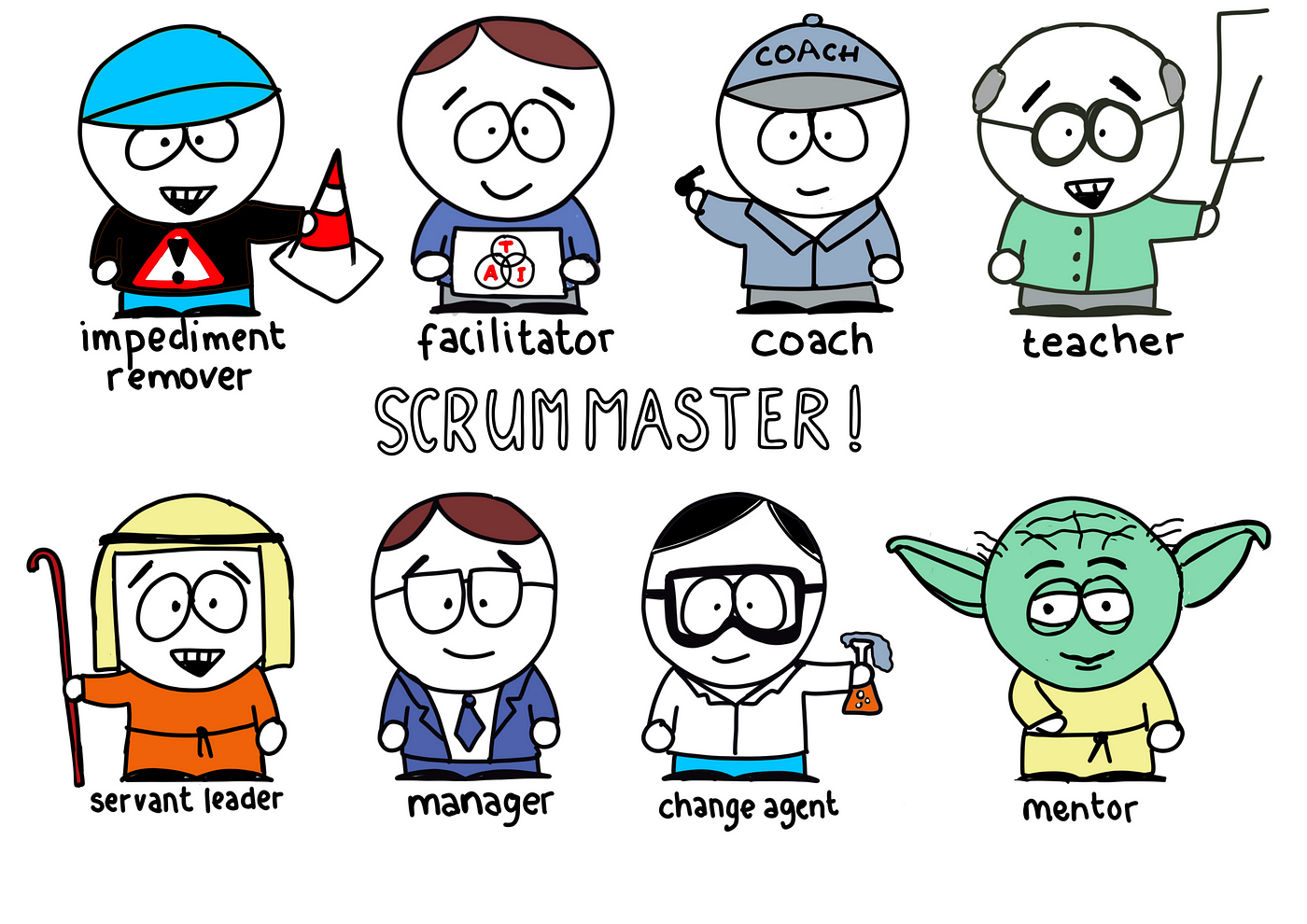
What does a Scrum Master?

What does a Scrum master the whole day?
Are you just a fancy administrator, or are you actively removing impediments?
Do you coach your teams toward mastery?
Too often, Scrum masters become Scrum administrators.
They schedule meetings, moderate discussions, write progress reports, and draw beautiful slides on how to improve the organization.
Or worse, they collect extensive statistics about velocity, planned versus delivered story points or how precise story estimation was.
At the end of the day, your job is to mentor your team to be champions and build awesome products [1, 2, 3].
Wake up! You are not a product manager, you shall be a catalyst.
Facets of a Scrum Master
-
Be a servant leader whose focus is on the needs of the team members and those they serve (the customer), with the goal of achieving results in line with the organization’s values, principles, and business objectives.
-
Teach ensuring agile, lean, Scrum, and other approaches are understood and enacted.
-
Mentor to transfer agile knowledge and experience to the team and concentrate on continuous improvement.
-
Coach the individual with a focus on their mindset and behavior.
-
Help the organization to truly collaborate with the Scrum team.
-
Be an impediment remover solving blocking issues to the team’s progress, taking into account the self-organizing capabilities of the development team.
-
Facilitate by setting the stage and providing clear boundaries on which the team can collaborate.
-
Be a change agent to enable a culture in which Scrum teams can flourish.
Remember the definition of an agile or Scrum team. Ask yourself if your team fulfils this definition. Work hard to improve if it is not the case. Each team is self-managing, cross-functional and customer-focused, co-located, long-lived.
Scrum Master Tasks
-
Help your teams to remove impediments [1, 2, 3]. From time to time, you could also remove a specific impediment.
-
Evangelise agile, lean values and principles.
-
Moderate Scrum meetings. Remember to regulate delegate moderation to your team.
-
Gently transform your department and organization to become more agile.
-
Remove yearly evaluation, practice biweekly face-to-face meetings.
-
Remove any individual bonus, introduce team bonuses. Better remove extrinsic motivators.
-
Remove test and quality department, move the specialists to the Scrum teams.
-
You shall by all means avoid administrative waste, such as
-
Writing information in Word documents or in Wiki that nobody actively uses.
-
Writing multiple times the same information.
-
Writing status information instead of publishing it on the team board. The board shall be the information radiator of your product development. Do not create head sinks in documents.
-
Holding meetings with one person projecting their notebook screen content and all other attendees looking at it.
Tips and Tricks
A good Scrum Master helps a Scrum Team survive in an organization’s culture. A great Scrum Master helps change the culture, so Scrum Teams can thrive.
Scrum Mastery
- Face 2 Face
-
Prefer physical meetings to all other communication mediums. Use the video conference and chatting tools to feel the mood of your team.
- Emergent
-
Good enough to try it, Safe enough to do it. Do not look for the perfect solution before trying a new approach.
- Plan Do Check Act PDCA
-
Embrace complex systems and try new approaches to improve your team. F focus on external and internal quality.
- Process Ownership to Keep It Alive
-
You are not in charge of the team processes, the team is,
- Community of Practice PoC
-
is an effective way to move your team to technical excellence.
If you are new to the role, read "The Great Scrum Master" from Zuzana Šochová. A more extensive list of books can be found here.
References
[1] Z. Sochova, The Great Scrum Master. Addison Wesley, 2016 [Online]. Available: https://www.amazon.com/dp/013465711X
[2] G. Verheyen, Scrum - A Pocket Guide, Third. Van Haren Publishing, 2021 [Online]. Available: https://www.amazon.com//dp/B0DFHNW45Q
[3] S. Ockerman and S. Reindl, Mastering Professional Scrum. Addison Wesley, 2019 [Online]. Available: https://www.amazon.com/dp/B07XTLNPTC